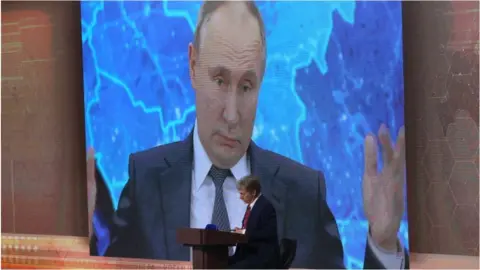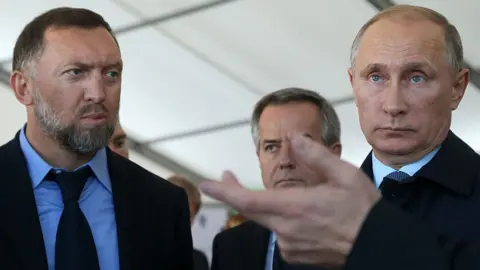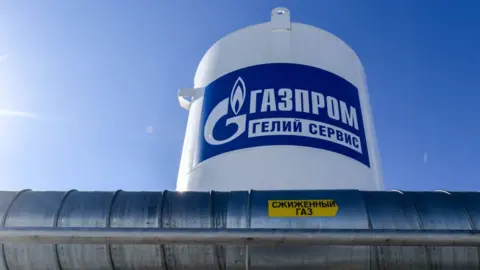Why have there been delays to UK Russia sanctions?
 Getty Images
Getty ImagesThe UK has added hundreds of people to its sanctions list, following Russia's invasion of Ukraine.
The passage of the Economic Crime Act has made it easier for the government to take action against people already sanctioned by the US, the EU, Canada or Australia.
The government has published the names of more than 750 individuals and companies it has sanctioned since the invasion.
Some of them appeared on a list of 35 people who Russian opposition leader Alexei Navalny suggested should be sanctioned.
Sanctions delayed
There has been criticism of the amount of time it has taken the UK to impose sanctions on some of the individuals.
For example Oleg Deripaska, an industrialist with close ties to President Putin, has been sanctioned in the US since April 2018, but was only sanctioned in the UK on 10 March 2022. He has not been sanctioned by the EU.
The US Treasury said he had been "investigated for money laundering, and has been accused of threatening the lives of business rivals, illegally wiretapping a government official, and taking part in extortion and racketeering. There are also allegations that Deripaska bribed a government official, ordered the murder of a businessman, and had links to a Russian organized crime group."
 Getty Images
Getty ImagesAndrey Kostin, president of the Russian state-owned VTB bank, has also been sanctioned in the US since April 2018 and was sanctioned by the EU on 23 February 2022. He was added to the UK list on 10 March.
President Putin's spokesman Dmitry Peskov and his chief of staff Anton Vaino were both sanctioned by the EU on 28 February but not by the UK until 15 March.
Russian Prime Minister Mikhail Mishustin was added to the EU list on 25 February but not sanctioned in the UK until 15 March.
Sanctioned elsewhere
Since the invasion on 24 February, the EU has sanctioned 424 individuals who have not been sanctioned by the UK.
The US has sanctioned 38 individuals who are not on the UK's list.
There are still four individuals named by Mr Navalny who appear on the EU or the US sanctions list but not on the UK's.
Alexander Kalashnikov, added by the EU to their list of human rights violators, was sacked as director of Russia's Federal Penitentiary Service in 2021, after a scandal concerning the widespread practice of torture in Russian prisons. He is also sanctioned by the US.
Victor Zolotov, on the US and EU lists but not on the UK's, leads Russia's National Guard. His family is one of the richest in Russia in the real estate sector.
On 23 February, the EU added two people not sanctioned in the UK to its sanctions list:
- Vladimir Soloviev, a Russian television presenter
- Margarita Simonyan, editor-in-chief of the Russia Today television news network
Not in the US or EU
There are four individuals on the list who have been sanctioned in the UK but not in the US or the EU.
All of them were sanctioned on 15 March and had already been sanctioned by Canada:
- Konstantin Ernst a television producer and Putin ally
- Alexander Beglov, governor of St Petersburg
- Yuri Chaika, Russia's former prosecutor general who has also been sanctioned by Australia
- Sergei Sobyanin, mayor of Moscow.
Roman Abramovich, the Russian billionaire former owner of Chelsea FC who was sanctioned by the UK government on 10 March because of his links to Russian President Vladimir Putin, was not sanctioned by the EU until 15 March.
 Getty Images
Getty ImagesRussian companies
There have also been questions in parliament about why action has not been taken against some Russian companies.
Gazprom is one of the world's biggest natural gas companies and is partly state-owned.
The US has sanctions against Gazprom but the UK does not.
The same is true of Rosneft, the Russian oil company, which is 40% owned by the Russian state, and 20% owned by British oil giant BP.
But the UK has imposed sanctions on Igor Sechin, chief executive of Rosneft, who was sanctioned by the US in April 2014.
It has also sanctioned Alexei Miller, chief executive of Gazprom, who the US sanctioned in April 2018.
On 8 March, the government announced it would be phasing out imports of Russian oil by the end of 2022.
The UK has also imposed a ban on exporting luxury goods to Russia and will put a 35% tax on some imports from Russia, including vodka.
Why has the UK not sanctioned more individuals?
At the start of the invasion, Foreign Secretary Liz Truss said the government has "a hit list of oligarchs and Duma members", but the cases against them needed "to be legally watertight so that when we hit them, the hit sticks".
Dr Anna Bradshaw, a partner at Peters & Peters Solicitors, an expert on law relating to financial crime and economic sanctions, says individuals and companies have no legal means to prevent the government from adopting sanctions against them.
She says that once sanctions are adopted any challenge is first reviewed by a government minister. If the government refuses to overturn the sanction, the individual can then take the matter to court.
But the sanctioned individual can only pay their lawyers or any court fees with a licence from the Treasury. Even if a licence was granted the sanctioned individual might still find that there was no bank prepared to carry out the transaction.
Nigel Kushner, from W Legal Ltd, who advises people targeted by sanctions, says legal challenges "should be very carefully thought out because they may backfire", because unless there was no basis whatsoever for the sanctions, a successful challenge might just lead to the "person being designated again but this time with mountains of appropriate evidence in support".
It is also possible that if the government lost in the courts it could pass legislation to allow the sanctions to continue.
Legal expert Prof Kern Alexander says it is "sensible" for the foreign secretary to review the cases against certain Russian oligarchs because UK human rights and other laws guarantee the rights of individuals and companies.
The government has to give the individuals and companies prior notice that the sanctions will be imposed, and they have to be given the opportunity to be consulted, and to contest, the proposal. It also needs evidence to show how the sanctions relate to the policy of stopping the Russian invasion of Ukraine.
Prof Alexander says the individuals can argue that "they do not have any influence with President Putin (or even that they do not know him) and that their wealth does not relate or support the Russian army or war machine and that imposing sanctions on them will not contribute to stopping or inhibiting Russian's invasion of Ukraine".
There have been examples of sanctions being overturned in the courts. One of them was a 2010 case in which the Supreme Court ruled that the government had overstepped its powers by freezing the assets of five people suspected of involvement with terrorism.
In response to the ruling, the government quickly passed legislation that meant they did have the power to impose the sanctions.

Russia attacks Ukraine: More coverage
- LIVE: Latest updates from on the ground
- WATCH: On the front line with Ukrainian soldiers
- IMAGES: Scale of destruction in Mariupol revealed
- WAR CRIMES: Could Putin be prosecuted?
- IN DEPTH: Full coverage of the conflict




